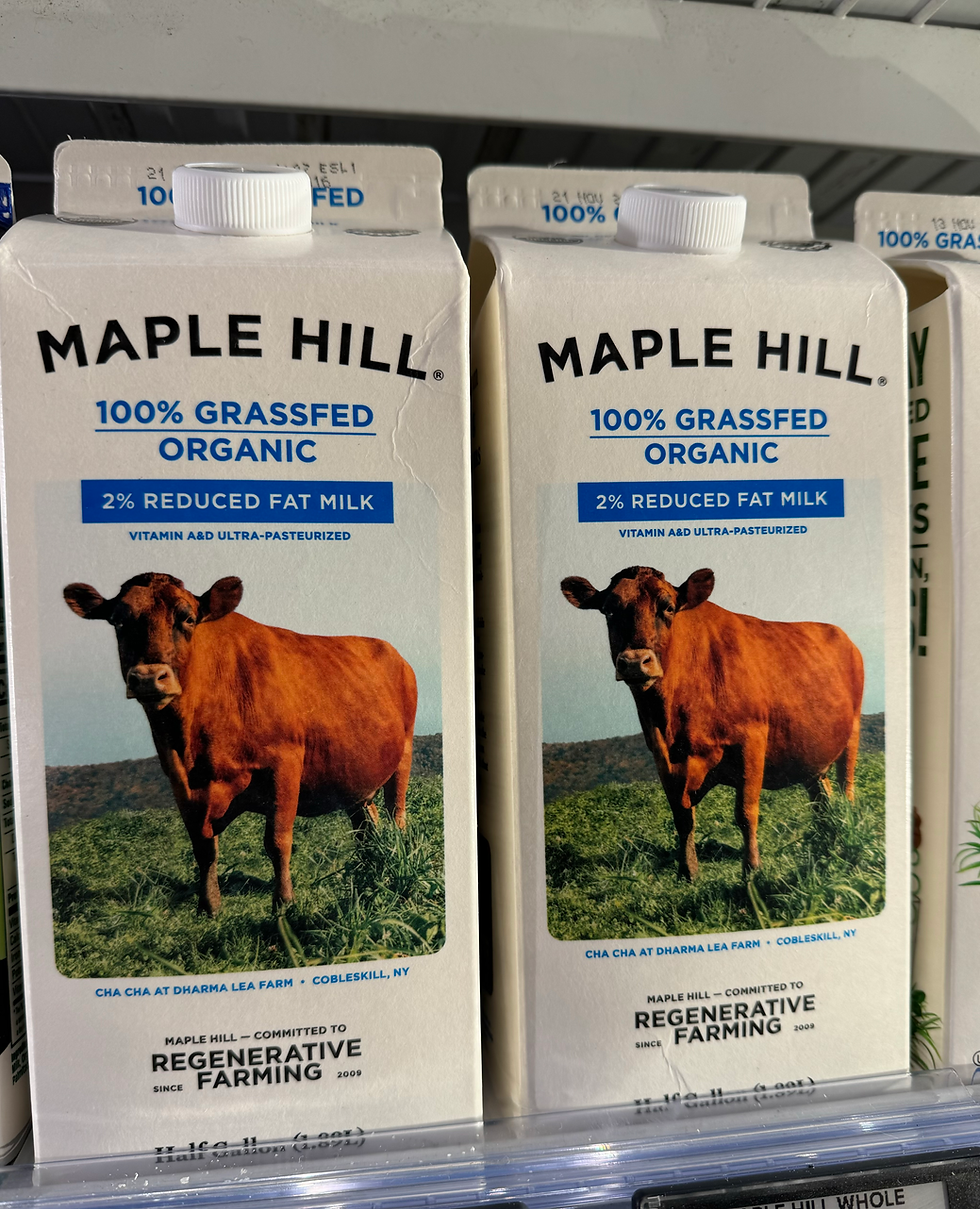Growing Healthy Grass without Pesticides
- Jul 10, 2025
- 4 min read
According to the USDA, between 20-40% of crops around the world are lost to pests, costing our global economy a combined $290 billion dollars for both invasive insects and plant disease. An agricultural “pest” describes any organism that interferes with the production of crops and livestock. For an organic dairy farm like Maple Hill, our farmers need to keep the soil, the grass, and our dairy cows safe from pests, all without chemical pesticides and herbicides. How do they do it?
Table of Contents:
What is Organic Dairy Farming?
Pasture Rotation
Cover Crops
Organic Fertilizer

What is Organic Dairy Farming?
Organic dairy farming is the practice of producing sustainable dairy without the use of synthetic fertilizers or pesticides on the land, and without hormones or unnecessary antibiotics for the dairy cows.
Our milkshed of 130+ family farms across the northeastern U.S. face the same kind of pest pressures as conventional farms and dairies. We need to make sure that the dairy cows are well fed, our pastures are thriving with different natural grasses, and the soil is well-cared for in order to support the entire system – all without pesticides.
The use and overuse of chemical pesticides puts our health at risk, contaminates soil and water, and harms pollinators and other beneficial insects.The more that we rely on pesticides, the more resistant these pests become, requiring stronger and stronger chemicals to be effective.
Our goal is not just sustainability — we aim for regenerative farming, which means that the land used for our dairy pastures will be improved by our practices. Carbon sequestration is a key part of this, since biodiverse pastures are able to pull carbon from the atmosphere. The health of our soil is at the center of this strategy, and our farmers use several different organic techniques to make sure we’re giving back to the land.
Pasture Rotation
There is a balance between a herd of cows grazing in a pasture and providing the soil with nutrients versus overgrazing, where cows in confinement eliminate biodiversity and overcompact the soil.
Moving our cows to different pastures to graze is the secret to building soil resistance and promoting beneficial insects that prey on pests. The manure from our cows improves the fertility of the soil and helps it retain more water, encouraging biodiverse grasses to grow. We don’t want too much grazing or too much manure to create an imbalance, so farmers manage where our cows eat throughout the growing season.
It’s harder for insect pests to grow larger populations in a single pasture when cows rotate from one to the other, and their overall numbers are greatly reduced. When pastures are able to rest and regrow, it gives time for the parasites to hatch, live their life cycles without an animal host, and then die off before the cows return to that pasture.
Stronger soil, better plant growth, and reduced pests are all part of our pasture rotation strategy to ensure the land becomes more fertile for the future.
Cover Crops
In conventional farming today, farmers plant a single crop across their fields and leave the soil bare during the off season. This leaves the soil open to the elements and impacts the nutrition of the soil for future planting. This practice, also known as “monocropping,” requires farmers to use an increasing amount of chemical pesticides and synthetic fertilizers to make up for the nutritional losses. Monocropping lacks the benefits that come with biodiversity, such as stronger, more resilient soil.
Maple Hill farmers use continuous, biodiverse crops on their land in all seasons — the soil is never completely tilled and barren. This method of cover cropping has a number of benefits and reduces the need for chemical pesticides.
Here’s how cover crops work to reduce the need for chemical pesticide:
Provide a Physical Barrier — The dense roots of cover crops provide a physical barrier against weeds, which means that there is less competition for nutrients and water.
Improve Soil Conditions — Cover crops benefit the soil by adding organic matter, which enhances water retention and aeration. When they cycle nutrients, it reduces the need for synthetic fertilizers and can help balance soil pH, creating an unfavorable environment for certain pests.
Create a Beneficial Insect Habitat — Cover crops attract helpful insects like ladybugs, which prey on harmful pests. Many cover crops are excellent sources of nectar and pollen, supporting pollinators that support future crop pollination.
Cover crops include legumes like alfalfa and clover, and grasses like ryegrass — all grasses that our dairy cows enjoy throughout the year — support our land and animals without chemical inputs.
Organic Fertilizer
Synthetic fertilizer comes with the hefty risk of environmental pollution and negative health impacts. It can impact the soil’s pH balance, which makes it harder for helpful insects to thrive. The excessive nitrogen in synthetic fertilizer can cause “fertilizer burn,” or nutrient starvation in the soil.
Maple Hill dairy farms use nature’s oldest fertilizer, which our dairy cows graciously provide, to fertilize our farms. Manure is rich in nutrients like nitrogen, phosphorus, and helpful microorganisms — and with practices like pasture rotation, our farmers can avoid fertilizer burn and other negative impacts. Cover crops also contribute to the fertilization of the pastures, by adding organic matter to the soil year-round.
When you work with nature instead of against it, the simplest solutions are often the best.
Learn More About 100% Grass-Fed Organic Farming
Organic farming is more about avoiding pesticides and caring for our soil — our farmers work hard to make sure our dairy cows get the nutrition they need to produce a nutrient-dense final product.

You can learn more about Maple Hill 100% grass-fed dairy products here, or read a few articles that dive deeper into organic and 100% grass-fed farming.
Read more:
Sources:









